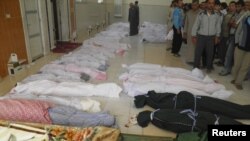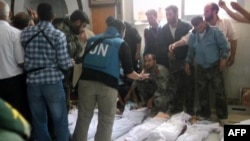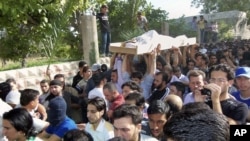Syrian opposition forces say more than 90 people, many of them children, have been killed in a coordinated assault on a village outside the city of Homs by government artillery and militiamen. Government officials do not deny the massacre but blame unidentified "terrorists" for one of the deadliest incidents since the start of an uprising against President Bashar al-Assad's administration more than a year ago.
Amateur video
Amateur video shows families burying the dead from Friday's massacre between several long rows of cinder blocks. As elsewhere in Syria, emotions in the cluster of towns that make up Houla are running high.
Witnesses say the killing began when government forces shelled the village of Teldau soon after Friday prayers. Opposition activists say some of the victims, many of whom are children, were killed in the shelling, while others were shot by pro-government militiamen known as “shabiha.”
A woman resident of Teldau claims on a video distributed by opposition forces that she and her daughters-in-law managed to escape the village after it came under attack from militiamen who destroyed part of her house.
But she says several other relatives were slaughtered by security forces dressed in black, who killed them with knives.
Observers
A team of U.N. observers headed by General Robert Mood, arrived in Houla Saturday to investigate the killings.The general condemned the "brutal tragedy" and said the observers counted more than 32 children under the age of 10 and over 60 adults killed.
Video of UN Observers in Syria
The acting head of the opposition Syrian National Council urged the U.N. Security Council to hold an emergency session to discuss the brutality.
United Nations Secretary-General Ban Ki-moon and the U.N.-Arab League envoy for Syria, Kofi Annan, condemned the violence. The two described the attacks as an "appalling and brutal crime involving indiscriminate and disproportionate use of force."
Responsibility
Syrian government TV charged that “terrorists” were responsible for the massacre in Houla. The government often refers to rebel soldiers and other opponents as “terrorists,” claiming that they are part of an outside plot to destabilize the country.
Thousands of mourners turned out Saturday in Syria's largest city, Aleppo, to protest the killings. Large student protests have roiled the city in recent days, after months of relative quiet compared to the rest of the country.
Other attacks
In the Qaddam district of Damascus, government security forces opened fire on mourners, causing a large crowd to scatter in all directions. It was not immediately clear if there were victims.
Hilal Khashan, who teaches political science at the American University of Beirut, says he doubts the killings in Houla will provoke serious international outrage, since the world has grown weary of the conflict. Still, he sees the killings as a sign that the Assad government is slowly collapsing.
“There [is] no doubt in my mind, that Assad's regime is faltering, but it is dying hard," he said. "Before the regime expires, it will take along with it a large number of innocent civilians.”
Cease-fire
The killings in Houla strike another blow at a cease-fire brokered by Kofi Annan. Close to 300 U.N. monitors are on the ground in Syria to observe the cease-fire which began on April 12, but violence is picking up again, after an initial lull.
U.N. Secretary-General Ban Ki-moon reported what he called “small progress” in implementing the plan, Friday. He went on to accuse the government of “unacceptable levels of violence and abuses.”
Amateur video
Amateur video shows families burying the dead from Friday's massacre between several long rows of cinder blocks. As elsewhere in Syria, emotions in the cluster of towns that make up Houla are running high.
Witnesses say the killing began when government forces shelled the village of Teldau soon after Friday prayers. Opposition activists say some of the victims, many of whom are children, were killed in the shelling, while others were shot by pro-government militiamen known as “shabiha.”
A woman resident of Teldau claims on a video distributed by opposition forces that she and her daughters-in-law managed to escape the village after it came under attack from militiamen who destroyed part of her house.
But she says several other relatives were slaughtered by security forces dressed in black, who killed them with knives.
Observers
A team of U.N. observers headed by General Robert Mood, arrived in Houla Saturday to investigate the killings.The general condemned the "brutal tragedy" and said the observers counted more than 32 children under the age of 10 and over 60 adults killed.
Video of UN Observers in Syria
The acting head of the opposition Syrian National Council urged the U.N. Security Council to hold an emergency session to discuss the brutality.
United Nations Secretary-General Ban Ki-moon and the U.N.-Arab League envoy for Syria, Kofi Annan, condemned the violence. The two described the attacks as an "appalling and brutal crime involving indiscriminate and disproportionate use of force."
Responsibility
Syrian government TV charged that “terrorists” were responsible for the massacre in Houla. The government often refers to rebel soldiers and other opponents as “terrorists,” claiming that they are part of an outside plot to destabilize the country.
Thousands of mourners turned out Saturday in Syria's largest city, Aleppo, to protest the killings. Large student protests have roiled the city in recent days, after months of relative quiet compared to the rest of the country.
Other attacks
In the Qaddam district of Damascus, government security forces opened fire on mourners, causing a large crowd to scatter in all directions. It was not immediately clear if there were victims.
Hilal Khashan, who teaches political science at the American University of Beirut, says he doubts the killings in Houla will provoke serious international outrage, since the world has grown weary of the conflict. Still, he sees the killings as a sign that the Assad government is slowly collapsing.
“There [is] no doubt in my mind, that Assad's regime is faltering, but it is dying hard," he said. "Before the regime expires, it will take along with it a large number of innocent civilians.”
Cease-fire
The killings in Houla strike another blow at a cease-fire brokered by Kofi Annan. Close to 300 U.N. monitors are on the ground in Syria to observe the cease-fire which began on April 12, but violence is picking up again, after an initial lull.
U.N. Secretary-General Ban Ki-moon reported what he called “small progress” in implementing the plan, Friday. He went on to accuse the government of “unacceptable levels of violence and abuses.”






